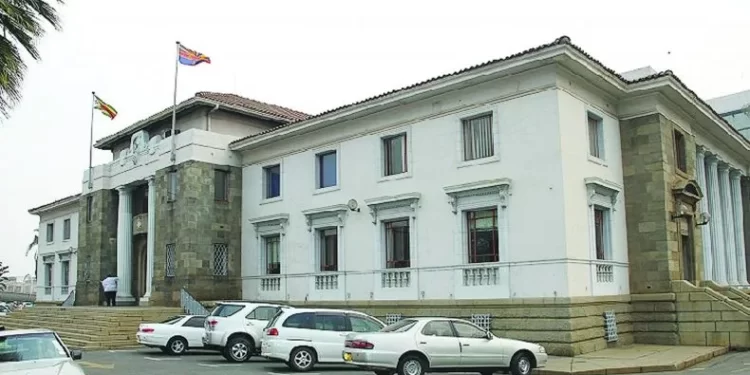Harare City Council has been again cited in the most recent report on Local Authorities by the Auditor-General for not providing a complete accounting of its finances.
According to Acting Auditor-General Rheah Kujinga’s report, the audit was completed without enough information, hence the council was unable to make a decision.
“I do not voice any opinions about the City of Harare’s financial statements. I have not been able to gather enough relevant audit evidence to provide a foundation for an audit opinion on these financial accounts because of the importance of the issues detailed in the foundation for Disclaimer of Opinion part of my report,” Kujinga said.
Due to inadequate accounting procedures implemented by the city council, Harare was unable to provide enough data for the audit.
After the local government neglected to pay for the Business Intelligence Quotient (BIQ) System for five consecutive months, Quill Associates, the system’s former supplier, unexpectedly terminated its service in 2019.
Since then, the local government has failed to acquire an accounting system, which has led to income leaks and poor service delivery.
According to Kujinga, not all of the transactions that took place at the local government are accurately reflected in the information that Harare presented for audit.
“After the BIQ financial accounting and reporting system was removed in March 2019, the accounting and financial management system of the City Council came to an end. In order to determine if all of the balances and transactions that were documented during the year under review had really happened, been appropriately categorised, and been fully and properly recorded, I was unable to gather enough relevant information.
Furthermore, I was unable to obtain sufficient appropriate evidence that management had fulfilled its responsibility in preparing and fairly presenting the financial statements in accordance with International Public Sector Accounting Standards (IPSASs) or to verify the reported balances through alternative means.
According to Kujinga, “I believe that the financial statements that the City of Harare submitted are not based on credible underlying accounting records because there was no credible financial accounting system, based on the audit evidence I gathered.”
The previous Auditor-General, Mildred Chiri, cautioned the council in 2020 against running the organisation without a suitable accounting system in place.
Harare claims they were unable to withdraw all 64 cashbooks from the system due to the sudden nature of the cancellation. Chiri suggested in 2020 that mechanisms be implemented in order to deal with the issue of governance.
“The cashbooks of the Council were not provided for the audit. Additionally, the bank account-linked cash receipts and payment records were not available.
Bank account reconciliations and EcoCash account authorizations were not updated, nor were they properly checked and authorised.
There were bank accounts that weren’t included in the accounting software. There is a chance that fraudulent transactions would go unnoticed and unaddressed, which might result in financial loss.
It is my recommendation that the council guarantee sufficient and appropriate record-keeping. In the prior report, Chiri said that monthly bank reconciliations have to be completed and examined.
Citing inadequate evidence, acting Auditor-General Kujinga was unable to reach a conclusion on the revenues submitted by the local government a year later.
Following the publication of Chiri’s report, the Public Accounts Committee of Parliament launched an investigation into the chaotic condition of the local authority’s accounting and found similar findings.
The MPs were informed that all invoices and receipts were now completed by hand, which was a nightmare for finance officials, in response to their question.
The present Sage system, which replaced BIQ, is non-functional, and it is a nightmare to operate in this day and age without a functioning system, according to Mr. Mhukarume (Francis), the Finance Director of Harare City.
He said that Harare City was having trouble with manual receipting. Consequently, not every receipt was precisely recorded. Because SAGE lacked the capability, the billing was not being done correctly. To put it briefly, Harare City was running entirely automatically without the need of an accounting system. Due to the lack of a mechanism, procurement was also impacted.
In the end, the financial reporting of the Harare City Council was opaque, which is a symptom of failure. According to the PAC report, Mr. Mhukarume further said that the existing environment was a nightmare since the only module that was operational was the billing module, which was only functioning at 50%.
Meanwhile, the inability of the local government to account for its subsidiaries has continued, in addition to the accounting disaster at Harare City Council.
In the most recent report, Kujinga made the following observation: “The City of Harare’s investments in subsidiaries, associates, joint ventures, and other businesses were not fully disclosed or consolidated by the Council.
The City of Harare does not provide financial accounts for its subsidiaries, affiliates, joint ventures, or other invested businesses. The work of related auditors and other auditors in the audit of group financial statements, as outlined in International Standard on Auditing (ISA) 600, mandates that group auditors have complete access to data on all group components.
Furthermore, the management announced the termination of the partnership agreement with Easi-park (Pvt) Limited. The claimed termination’s terms and circumstances, as well as how the termination was recorded in the council’s records, eluded me. Furthermore, the council’s financial statements had never included this joint venture in compliance with accounting requirements.
In order to verify that the financial statements and the notes thereto were correctly produced in compliance with applicable standards, I was unable to gather enough relevant audit evidence.
“International Public Sector Accounting Standard (IPSAS) 6- Consolidated and separate financial statements requires the consolidation of all controlled entities,” said Chiri, her predecessor, in response to questions about subsidiaries.
I saw that Sunshine Holdings, City Parking (Pvt) Ltd, Rufaro Marketing (Pvt) Ltd, and other fully owned subsidiaries of the City of Harare were not accounted for or consolidated. The identified entities were not permitted access, and the total amount of investments might be substantial and noteworthy. Furthermore, it was not apparent whether all of Sunshine Holdings’ interests were known.
The management did not follow through on their pledge to investigate and address the situation by 2019.
Notably, in 2019 all subsidiary accounts will be combined. Management said, “Council will make every effort to adhere to all IPSAS Guideline requirements.”
The Auditor-General had identified six local administrations, including Harare, for not providing enough data for an audit.
Source ZiMetro news









